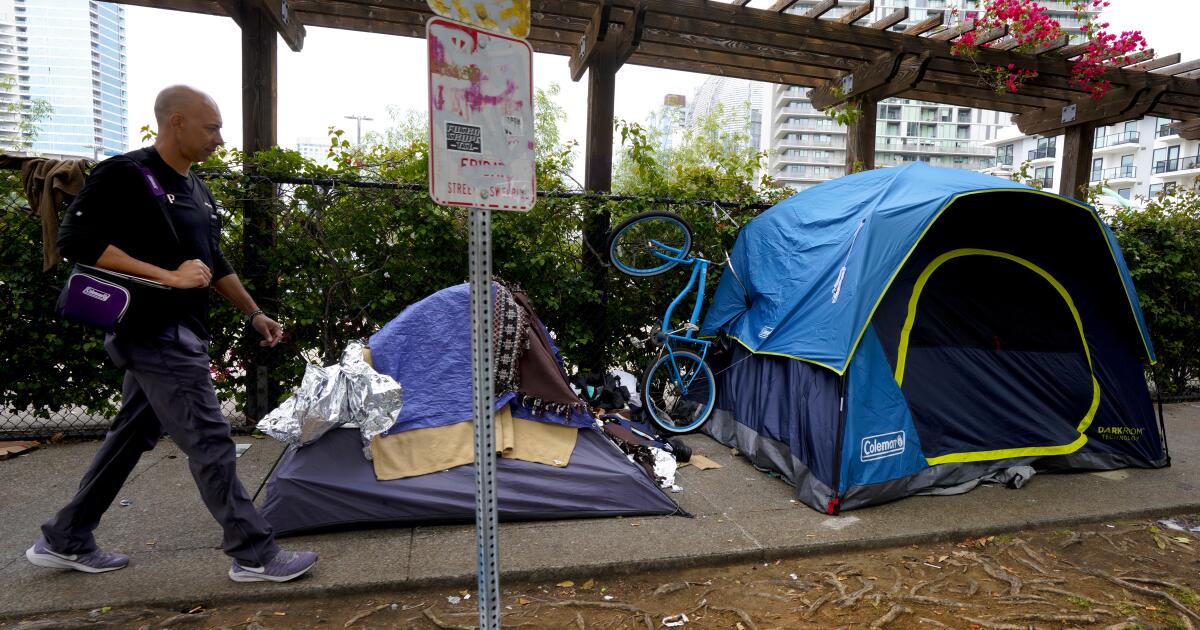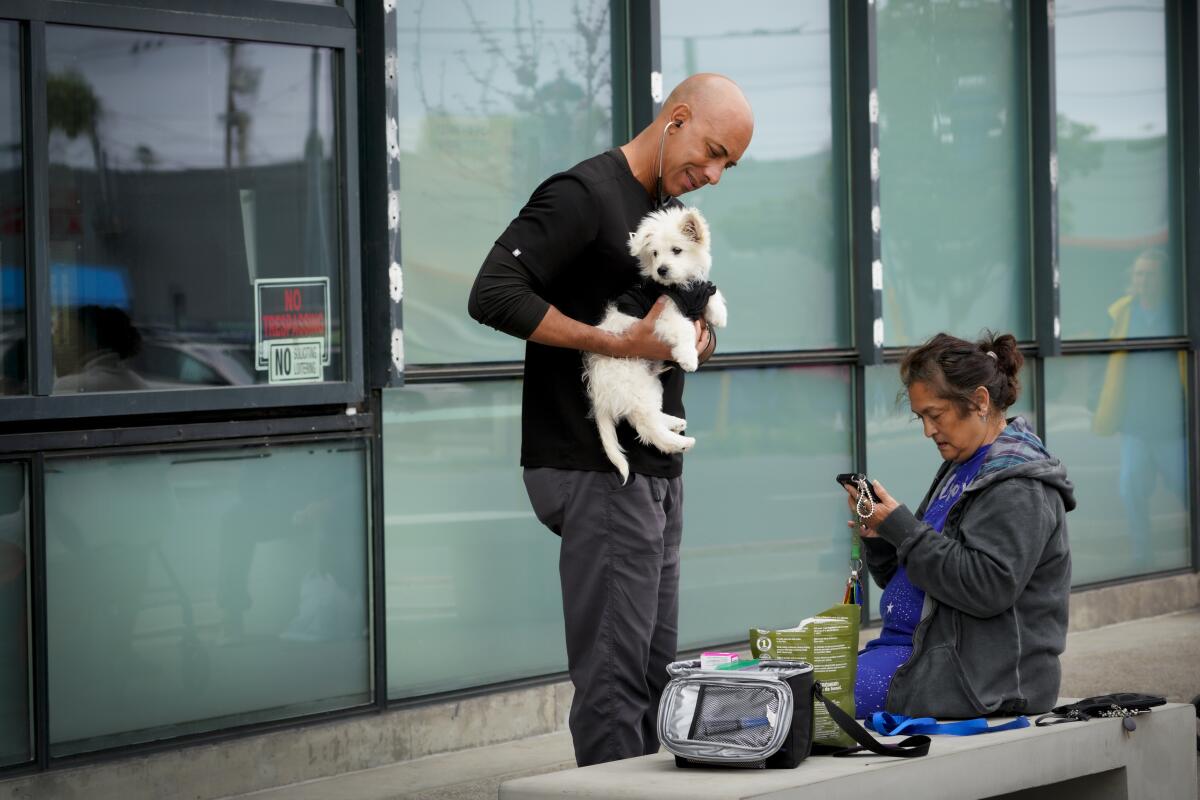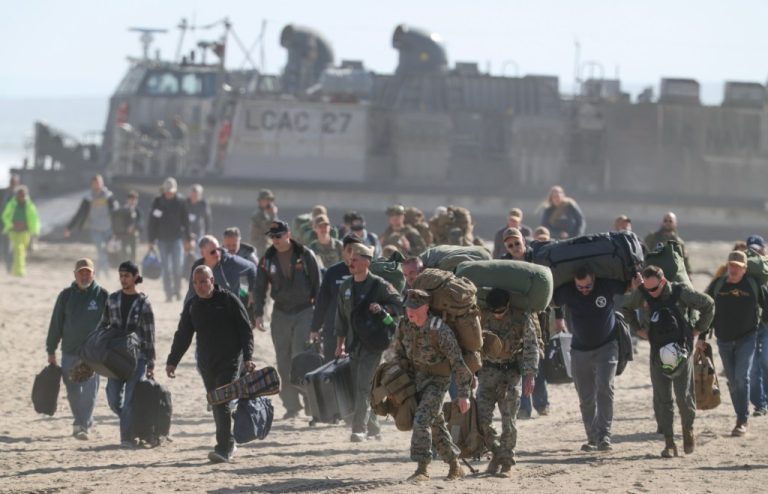
Veterinarian and North County resident Dr. Kwane Stewart has been tapped at one of 10 CNN Heroes of 2023, in the running to be named the CNN Hero of the Year for his work treating the pets of unhoused people.
Stewart founded Project Street Vet. Through it, veterinarians hit the streets to treat the pets of homeless people. It started quietly, a one-man secret mission in the poorest parts of California towns. It now involves veterinarians volunteering in several cities, from San Diego and Los Angeles to Orlando, Atlanta and Washington D.C.
The Top Ten finalists, including Stewart, will be awarded $10,000. The person among them who is ultimately tapped as the CNN Hero of the Year will receive an additional $100,000 to continue their work.
People can vote — up to 10 votes a day — for their choice for CNN Hero of the Year by going to CNNHeroes.com via email or Facebook. Voting ends 11:59 p.m. Dec. 5.
Stewart — who doesn’t know who nominated him for the award — talked with the Union Tribune earlier this month about how he got here, what’s next and what the prize money could do.
The idea came to him during his own personal crisis
In 2011, Stewart was a veterinarian at a Central Valley animal shelter. There was a recession, and people were “dumping their animals,” he said. With overcrowding and public health hazards, euthanizations followed — dozens a day.
“I came very close to quitting being a veterinarian altogether,” he said.
While writing his resignation letter in his head, he stopped for coffee at 7-Eleven. Saw the same unhoused man he usually did. But this time, he noticed the man’s dog was in bad shape. It was a flea infestation so severe, the dog “looked like a burn victim,” Stewart said.
The animal doctor told the man he would return the next day with a treatment. He did, with a $3 medication in hand. Within 10 days, he said, “the dog was transformed. I mean, the hair was coming back, she was wagging her tail.
“The man sitting in the same spot looked up at me with, with tears in his eyes and he just said, ‘Thank you for not ignoring me,’” Stewart said.
“And I remember in that moment, I thought I’m well, I’m not gonna quit. I’m gonna start doing more of this on my time outside of work.”
From Hollywood movie sets to Skid Row
For years, he walked the poorest parts of California towns, treating the pets of unhoused people, paying for medicines and hospital stays out of his own pocket, while still paying off student loans.
Stewart left his shelter job for Hollywood. He headed American Humane’s “No Animals Were Harmed” program, which works on film sets to ensure the safety of animals during productions. Met a few celebrities, made it onto a few podcasts, got a couple helpful donations, checks for $10,000, maybe $15,000.

Dr. Kwane Stewart checks a dog’s health in the Skid Row area of Los Angeles on June 7, 2023.
(Damian Dovarganes / Associated Press)
After being with stars on sets, he’d go walk Skid Row, a bag full of medication and supplies slung over his shoulder.
He moved to San Diego County in 2015 and did his street work in both cities. In 2020, he founded Project Street Vet as a nonprofit charity.
The work relies on donations
Everyone in the field volunteers their time. All the money brought in goes toward medication and treatment, save for the salary of the director who manages the program. Stewart still has a day job as a veterinarian at an area clinic, and he also still consults for the film industry.
Most of the money is from private donors. Most often it’s young people — “a very generous generation of pet parents,” he said — who learn about Project Street Vet through social media.
“I get people volunteering, which is great. But the other half, I still need resources, finances to pay for the medications to get them into extensive care or extra care. So, as long as that (donation money) keeps coming in, we’ll keep doing the work and keep growing.
“The homeless problem isn’t going away. It’s only getting worse, and about 20 percent of our homeless own a pet, is what the census says. These pets are valuable to them for a lot of reasons — purpose, hope, love. I see that play out every time I meet them.”
Free dog food pantries are next
Unhoused pet owners will give up their own food for their pets. But it’s inconsistent and not always nutritious, Stewart said.
“Last week we built out a little shed, we’re calling it the Dog Food Pantry, and we placed it in an area of Skid Row (in Los Angeles). We’re going to stock that shed, that pantry, with food consistently.”

Dr. Kwane Stewart listens to Harley’s heart while her owner, Terry Gauci, sits nearby on March 31, 2022.
(Nelvin C. Cepeda/The San Diego Union-Tribune)
Stewart said the idea will debut in San Diego within the next couple of months. He wants dog food panties available in other cities, too.
CNN Hero of the Year prize money could help him spread Project Street Vet to other cities, pay for training and supplies. It could also help pay for treatments for animals, which can get pricey.
And he will continue to do it all for free.
What keeps him going
“I’ve never taken up a dollar for the work. I volunteer my time and I will continue to do so, but I just enjoy going and doing the work and just finding people knowing that I can provide care to them. The look, the moment, this exchange we have, when I stumble upon them, I can be in an alley and turn around and at the other side of a dumpster there’s someone living with a dog. Completely unexpected and spontaneous.
“I tell them who I am, just like the 7-Eleven moment. I get to my knee. I do the exam, take out my stethoscope, wellness care, vaccines, sometimes treatment right there under a traffic light. If they need a dental procedure or a tumor removal or X-rays, then I’ll get them into a hospital and we cover all the costs.
“And it’s that moment for me is the reason.”
The CNN Heroes’ All-Star Tribute hosted by Anderson Cooper will be aired at 5 p.m. Dec. 10.







